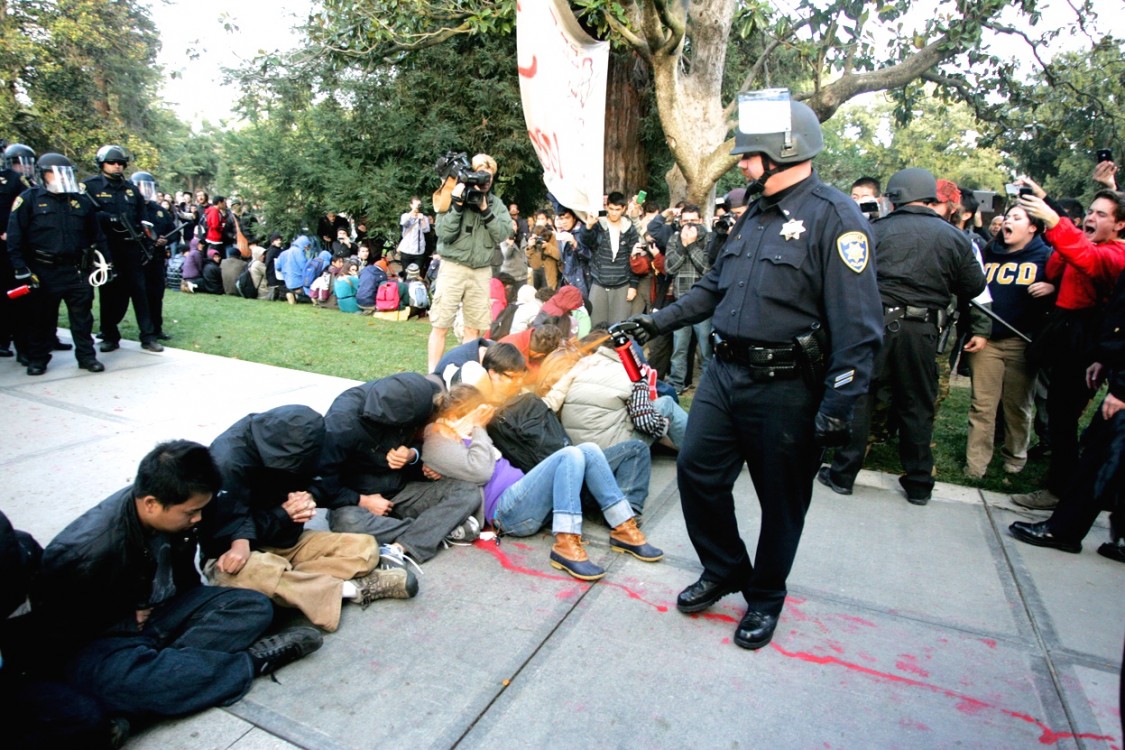
This is the second part of an article whose first part appeared Monday.
Racism, Classism and Policing
While police oppression hurts everyone, it disproportionately hurts people of color, a fact interwoven with police oppression towards poor people. The symbolic and identity-based degradation of people of color is a manifestation of a larger degradation – one of inequality, exploitation, and structured economic injustice.
The relationship between police oppression, economic oppression and racism was most supercharged in Ferguson because of the city's now-notorious system of trickle-up wealth extraction through tickets and fines. When stories emerged of this pervasive practice, Ferguson took on the image of a Kafkaesque prison camp for the working class, whose citizens walked in and out of revolving doors, paying the fines that kept this otherwise unviable municipal entity afloat. It’s impossible to separate that image of monetary enslavement from any meaningful conversation about race and police brutality there.
Racism is inexorably linked to economic oppression. The brutality of authorities emerges from their position as appointed guardians of economic and political hierarchy. Michael Shank of George Mason University’s School for Conflict Analysis and Resolution boldly speculates that the fight against racist policing is a site in the larger struggle for economic justice.
“Ferguson is the deadly and combustible combination of state-sponsored violence and structural racism,” he says. “We are witnessing similarly sinister developments in other cities, such as Detroit.” More racial diversity among cops won’t solve the problem because police brutality, as racialized as it is, remains a structural role problem, not a “race problem.” In other words, police of color can oppress citizens of color just as easily as white police can oppress white citizens. It is the social role of cops that contextualizes their brutality, and that social role includes the containment, control, and discipline of those at the margins of power.
To end police oppression, to create norms of public safety based on mutual respect and accountability, requires communities dedicated to economic justice. Ignore the gateway issue of economic justice, and even the most innovative visions of “alternative policing” fail to solve the underlying source of brutality. Rather, such strategies tend to simply combine traditional, authoritarian police work with community groups – the latter accepting the authority and political assumptions of the former, the former showing no real signs of learning from the latter.
When governments in economically unjust societies deputize citizens and build “grass roots” law enforcement brigades, the results are predictable. In the early 2000s, the British Home Secretary deputized thousands of “community support officers” and “civilian wardens”throughout England, giving them the power to enforce curfews, conduct house-to-house inquiries, issue citations and even use limited force in detaining individuals. These low-wage sub-policing jobs generated predictable civil liberties complaints, but they did not solve any crime.
The growing interest in “alternative policing” and private “community defense organizations” ignores the fact that a community is only as communal as its political and economic commitments allow it to be. Without a commitment to an anti-racist vision of economic justice, encounters with different-looking people, including people from neighboring communities, can replicate the encounters between thuggish cops and marginalized citizens.
I recently spoke with Lawrence Grandpre, Assistant Director for Research and Public Policy at Leaders for a Beautiful Struggle. Concerning community defense organizations, Grandpre reminded me of Shomrim, a community policing force active in Jewish neighborhoods throughout the country, including in Northwest Baltimore.
The Shomrim “was involved with an excessive force incident in Baltimore very similar to the Trayvon Martin incident in 2012,” Grandpre said. A 23-year-old Shamrom “deputy” was convicted of beating a 15-year-old African American boy, but like George Zimmerman, he claimed the boy had attacked him first. Shomrim members held the boy down between eight and 10 minutes. The vigilante assailant was given no prison time for the incident, instead receiving three years’ probation for charges (second-degree assault and false imprisonment) that carried a maximum sentence of 10 years.
White Baltimore business leaders testified in favor of the assailant during his sentencing, which Rev. Cortly C.D. Witherspoon, president of the Baltimore chapter of the Southern Christian Leadership Conference, called a display of “power, influence and classism.”
I asked Grandpre whether he believed alternative policing was possible in currently besieged communities – poor neighborhoods, communities of color, whether in Baltimore, St. Louis, or anywhere. “Unfortunately,” he answered, the highly-touted vision of happy community policing “is allowed to flourish in communities and in ways that support established systems of racism, white supremacy, and capitalism. Those in gated communities are allowed to have armed neighborhood watches, as they have proven by virtue of their economic status [that] they are ‘trustworthy.’”
No Justice, No Peace; New Justice, New Police
I don’t want public policy prescriptions, I don't have faith in the federal government, I want the police and the police state abolished. ~Rosa Clemente
Policing emerges from particular material relations. Change those relations, and you change the function, and even the attitude, of police. Fail to change those relations, and your alternative policing schemes are likely to fail to solve police oppression.
Google the terms “economic justice” and “police brutality” and you'll find dozens of anti-police oppression groups who include a general call for economic justice among their demands. But such groups need blueprints, and those dedicated to structurally remaking the economy need to include analysis of policing in their mosaic of change.
In many instances, those blueprints are already alive. Urban agriculture and self-sufficiency groups like Milwaukee’s Growing Powerempower poor and minority communities by freeing them from the death grip of corporate agriculture. The Southern Grassroots Economies Project supports networks of cooperative economies, including worker-owned cooperatives, using African-American cooperative ownership models. The Boggs Center in Detroit, one of the America’s most influential revolutionary facilities, builds “productive, sustainable, ecologically responsible and just communities” informed by the experience of urban revolutionaries of color. These are only a few of the groups offering blueprints for change that simultaneously engages the deadly combination of racism and classism responsible for police oppression.
Each successive step in democratizing the economy is a step away from police oppression and liberation from racist oligarchy. Municipalities funded by public banks rather than traffic fines would generate equitable social relations, eliminating the hierarchies that make brutality an endgame for cops. Public banks can finance city services, schools and even public safety, ending cities’ reliance on ideologically-laden federal and corporate funding sources.
Worker-owned cooperatives are models of egalitarianism that will be replicated at home, and in the streets. Postal banks should replace predatory payday lenders, entities that replicate the cycle of violence by issuing loans with outrageous interest rates. Economic justice advocates should continue to push for basic income guarantees, living wage ordinances, debt forgiveness and any other reforms that remake and democratize wealth, rather than relying on the good graces of philanthropic capital and its hired cops.
Leaders for a Beautiful Struggle’s Grandpre envisions communities dedicated to sharing food and cultural celebrations. “Even things as simple as community gatherings with food and cultural dance can begin to shift the framework of oppressed communities in ways that undermine the root causes of crime and violence; a sense of abandonment and cultural deracination,” he says.
"Building trust and community cohesion through meeting the community’s material and spiritual needs creates the conditions where the institutions that would serve as an alternative to traditional policing (patrols, community review boards) can spring organic from the community as opposed to being presented by savior intellectuals who are often disconnected from the community.”
Detroit writer, poet and activist Tawana Petty put it best when she pointed out that strong communities can generate their own, organic public safety. “The police department should be the last line of defense,” she told me. “We hold the tools in our communities to de-escalate most situations, but it begins with knowing who your neighbors are and taking an interest in their well-being.”
We may not be able to teach empathy to the aloof and powerful, but we can build institutions inside our communities that enable, fund, democratize and cooperatize empathy. Economic justice is, above all, materialized empathy. From new ways of working, producing, and sharing, new ways of protecting ourselves will grow.
Matt Stannard is an economic justice advocate working with several nonprofits and national advocacy organizations. Read the first part of this article here.
3 WAYS TO SHOW YOUR SUPPORT
- Log in to post comments
















